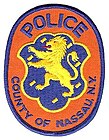Nassau County Police Department
| Nassau County Police Department | |
|---|---|
| Abbreviation | NCPD |

Patch of the Nassau County Police Department
|
|

Seal of the Nassau County Police Department
|
|

Flag of the Nassau County Police Department
|
|
| Agency overview | |
| Formed | 1925 |
| Legal personality | Governmental: Government agency |
| Jurisdictional structure | |
| Operations jurisdiction* | County (US) of Nassau in the state of New York, USA |
 |
|
| Map of Nassau County Police Department's jurisdiction. | |
| Size | 287 square miles (Land) 166 square miles (Water) |
| Population | 1,334,544 |
| Legal jurisdiction | Nassau County, New York |
| General nature | |
| Operational structure | |
| Police Officers | 2,250 (2010) |
| Police Commissioner [Acting] responsible | Thomas Krumpter |
| Agency executive | Kevin P. Smith, (Acting) Chief |
| Facilities | |
| Precincts | 6 |
| Website | |
| http://www.pdcn.org | |
| Footnotes | |
| * Divisional agency: Division of the country, over which the agency has usual operational jurisdiction. | |
The Nassau County Police Department is the law enforcement agency of Nassau County, New York.
In 1925, concerned about rising crime rates, the County Board of Supervisors voted to create the Nassau County Police Department, replacing a scattered system of constables and town and village police departments. (Some jurisdictions declined to join the police district, however, and maintain their own independent police forces to this day.) Consisting initially of Chief of Police (later Commissioner) Abram Skidmore, 55 officers and a fingerprint expert, the force grew to 450 officers by 1932 and reached 650 officers by the time Skidmore retired in 1945.
The expansion accelerated dramatically following World War II with the rapid suburbanization of the county. It reached 1,000 officers in six precincts by 1950. A seventh precinct was opened in 1955 and an eighth followed five years later. In the early 1970s, with crime and civil disorder in neighboring New York City and other cities a major concern, the force was boosted to its greatest strength, nearly 4,200 officers. Since then, it has declined to around 2,600, making it still one of the largest county police agencies in the United States.
Nevertheless, the department's reduced size has been a source of controversy, with the village of Mineola exploring the idea of seceding from the police district and establishing its own police force. On Dec. 5th, 2006, however, the village's voters decisively rejected the proposal, 2936 to 1288.
In October 2011, the Nassau County legislature voted on a budget that will have the effect of closing three of the eight precincts. In March 2012 the Levittown station was chosen to be the first to be reduced to a "Community Policing Center" followed by the 5th Precinct in Elmont, and 6th Precinct in Manhasset. The 5th Precinct has since reopened.
The NCPD's guiding philosophy is that it is a "service-oriented" police department, promoting the concept of the community as client, and the police as provider. (For example, officers will come to a citizen's home to take a crime report or complaint, rather than ask the citizen to come to the precinct.) Sociologist James Q. Wilson used the Nassau department as the exemplar of this approach in his classic 1968 study, Varieties of Police Behavior.
The department has historically been quick to embrace new technologies. The Marine Bureau began in 1933 with the gift of an 18-foot Chris Craft mahogany speedboat from the residents of Manhasset Bay. The Aviation Bureau followed a year later with the gift of a Stinson airplane from wealthy county residents. The aircraft was grounded by World War II, but the air unit was revived in 1968 with the purchase of four helicopters to assist in pursuits and medical evacuations. The Highway Patrol unit, which covers the Long Island Expressway and the Seaford-Oyster Bay Expressway and includes motorcycle officers, was founded in 1935. All police vehicles are now equipped with computer keyboards, and, since 1973, air conditioning.
...
Wikipedia
